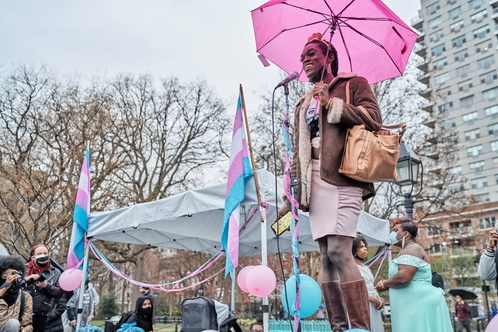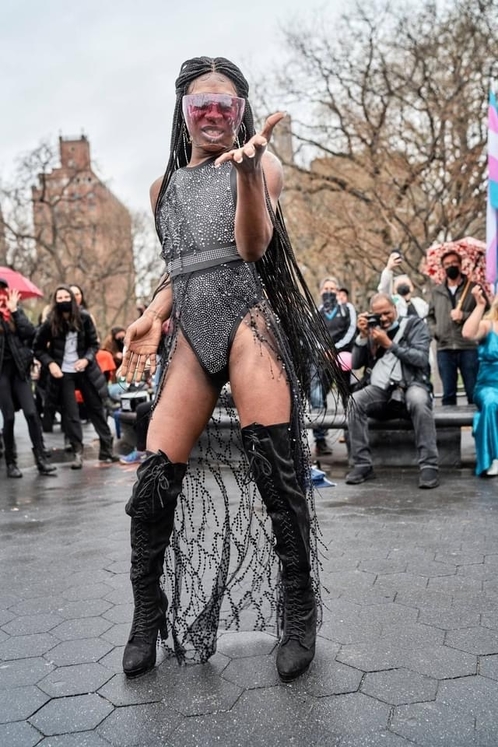Yesterday was International Transgender Day of Visibility. In New York City, the celebration in Washington Square Park defied the persistent rain. There were impassioned speeches, songs and poems …
… voguing (to Cardi B and Megan Thee Stallion — yay!) …
… line dancing …
… and fashion.
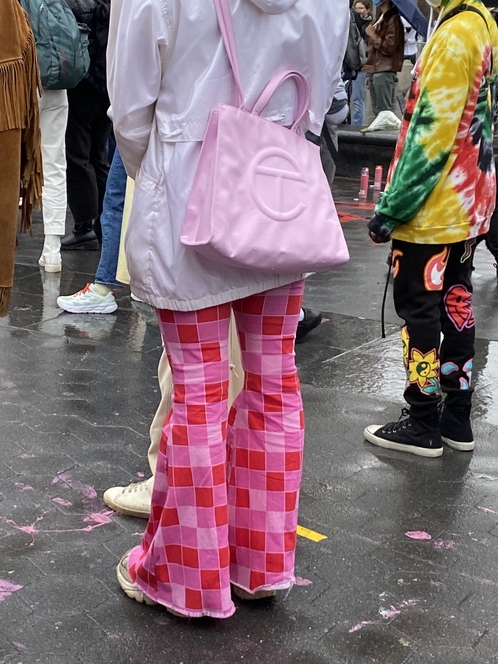
Organizers also set up a shrine to the 15 trans people murdered in the first 13 weeks of this year. A speaker emotionally read all of the victims’ names, giving their ages and the date and location of the homicide. One victim was only 16. Many were in their 20s.
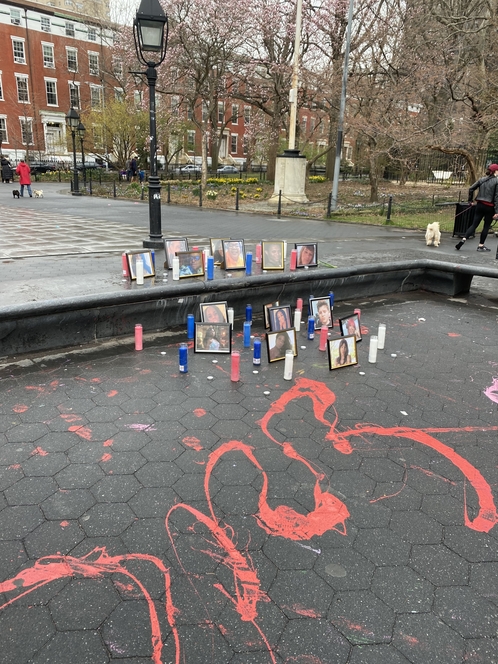
I spent time contemplating the shrine before the program started. The March 31 Transgender Day of Visibility was created in 2009 to amplify the successes of transgender and gender-nonconforming people, specifically as a counterbalance to the November 20 Trans Day of Remembrance. The day of mourning had by then been in existence for 20 years. Michigan-based activist Rachel Crandall, who launched the visibility day with a Facebook post, told Between the Lines News:
“I went on Facebook and I was thinking…whenever I hear about our community, it seems to be from Remembrance Day which is always so negative because it’s about people who were killed … So one night I couldn’t sleep and I decided why don’t I try to do something about that.”
Considering Crandall’s original motivation, I wondered how she would feel about the recent tragedies being highlighted. I assumed she’d approve: After all, the tone was set by the community for whom the occasion was created, and there was an ample amount of joy to behold. Furthermore, the day is called one of “Visibility,” not “Celebration,” and the trans community might be more visible than ever right now because it’s a top target of the Republican party’s latest culture war. At this very moment, the Republican Party is focusing on state legislation to strip basic human rights away from trans people — creating false narratives around the most vulnerable people in society in order to portray them as a threat rather than as the ones threatened. It’s reminiscent of former guy‘s incendiary comments about Asian people vis-à-vis COVID-19, and we’ve seen the surge in violent hate crimes that led to. This is exactly the kind of “othering” of minority groups that creates the environment for stochastic terrorism.

To push back, I want to make more visible the remarkable activist work that’s been done by transgender people in New York every week, for almost a year now. The organizers of yesterday’s event are also the regular leaders of The Stonewall Protests, a group that has been holding rallies and marches every Thursday (and sometimes other days as well), rain or shine. The protests are named for their starting point, the historic Stonewall Inn, which was the site of the anti-police 1969 riots that launched the modern gay rights movement. Two key participants of the 1969 uprising were transgender women of color: Marsha P. Johnson and Sylvia Rivera. Following in their footsteps are two of today’s leaders, Qween Jean and Joel Rivera.
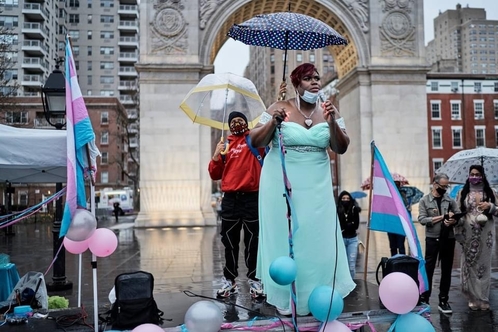
Qween, Joel, and their comrades have impressed me with their commitment to not just trans people, but to other vulnerable groups, including Black cisgender women, indigenous people, detained immigrants, unhoused people, and sex workers. Last Thursday’s march, for instance, was organized around solidarity with the Asian American community. After a pause for mid-Broadway voguing, it navigated through Chinatown with the chant “Stop Asian Hate.”
CLICK TO SEE MY CHINATOWN VIDEOS.
The Stonewall Protests group has also done mutual aid by participating in holiday toy drives for children, coat donations, and meal drives. While the LGBTQ+ press has paid attention to these efforts, I don’t recall seeing a word about any of this extremely time- and energy-consuming activism in the mainstream media. Instead, I’ve read far more than I wanted to about the concerns of Trump voters who frequent diners. My local paper, the New York Times, has seemed positively gleeful about covering the far right. Meanwhile, week after week, people risk their lives to speak out are ignored, even as they’ve become the subject of authoritarian politicians’ fear-mongering. So what can you do to help? One thing that costs nothing and doesn’t require you to live in New York is sending a letter to the New York Times. You can use my letter for inspiration, but please make it personal and from the heart. The more letters any publication gets about any one topic, the more likely it is to run one to represent the theme.
Other actions you can take:
- Follow The Stonewall Protests on Instagram.
- If you live in New York, go to the Stonewall events on Thursdays! (The official meeting time is 5 p.m., but usually it starts later.) DM me on IG to let me know if you’re going, so we can meet up.
- If you don’t live in New York, you can still donate to the effort and organizers. The Cashapp for the group is $stonewallprotests. Qween Jean’s Venmo is @Miss_Jean.
My best suggestion to watch Joel Rivera’s video “4 Things You Can Do For Black Trans People.” I think it’s important to hear her voice directly. Warning: I had to watch it twice because I kept getting distracted by her fabulous lewk!
UPDATED TO ADD: The 19th has a fresh interview with Rachel Crandall (now Rachel Crandall-Crocker).
